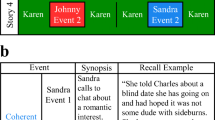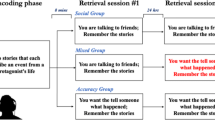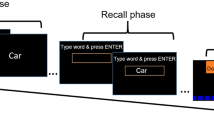Abstract
This research project was undertaken to investigate whether temporally ordered story events would be recalled in logical sequence as opposed to presentation order by various ages and under various task conditions. A 24-hour delayed condition was used as well as immediate recall. Six-year-olds, 8-year-olds, and adults were asked to recall four narratives. Instructions given were either vague or specifically required subjects to recall events exactly as they had been presented. Following the delayed recall, a picture-sequencing task was adminstered to assess whether picture cues would enable subjects to demonstrate awareness of input order even though they had reordered events in recall. All subjects reordered more during the delayed recall than during the immediate recall. Age differences (p<0003) occurred in the ability of subjects to demonstrate verbatim memory on the picture-sequencing task. Findings suggest that in contrast to adults, once children have reordered narrative events in memory, they no longer have an alternative verbatim version available. Results also suggest a greater schema dependency in children than in adults in recall tasks.
Similar content being viewed by others
References
Anderson, R. C., & Pichert, J. W. (1978). Recall of previously unrecallable information following a shift in perspective.Journal of Verbal Learning and Verbal Behavior, 17, 1–12,
Ardizzone, E. (1962).Paul the hero of the fire. New York: Henry Z. Walck.
Baker, L. (1978). Processing temporal relationships in simple stories: Effects of input sequences.Journal of Verbal Learning and Verbal Behavior, 17, 559–572.
Barrie-Blackley, S. (1972). Six-year old children's uderstanding of sentences adjoined with time adverbs.Journal of Psycholinguistic Research, 2, 153–167.
Brown, A. (1975). Recognition, reconstruction and recall of narrative sequence by preoperational children.Child Development, 46, 156–166.
Brown, A. L. (1975). The development of memory: Knowing,knowing about knowing, and knowing how to know. In H. W. Reese (Ed.),Advances in child development and behavior (Vol. 10). New York: Academic Press.
Buss, R., Yussen, S., Mathews, S., Miller, G., & Rembold, K. (1983). Development of children's use of a story schema to retrieve information.Developmental Psychology, 19, 22–28.
Flavell, J. H., & Wellman, H. M. (1977). Metamemory. In R. V. Dail, Jr., & J. W. Hagen (Eds.),Perspectives on the development of memory and cognition. Hillsdale, New Jersey: Erlbaum.
Goldman, R., & Fristoe, M. (1969).Goldman-Fristoe Test of Articulation. Circle Pines, Minnesota: American Guidance Service.
Hudson, J., & Nelson, K. (1983). Effects of script structure on children's story recall.Developmental Psychology, 19, 625–635.
Kintsch, W., Mandel, T. S., & Kozminsky, E. (1977). Summarizing scrambled stories.Memory and Cognition, 5, 547–552.
Mandler, J. M. (1978). A code in the node: The use of a story schema in retrieval.Discourse Processes, 1, 14–35.
Mandler, J. M., & Johnson, N. S. (1977). Remembrance of things parsed: Story structure and recall.Cognitive Psychology, 9, 111–151.
Mandler, J. M., & Robinson, C. A. (1978). Developmental changes in picture recognition.Journal of Experimental Child Psychology, 20, 122–130.
McClure, E., Mason, J., & Barnitz, J.(1979). An exploratory study of story structure and age effects on children's ability to sequence stories.Discourse Processes, 2, 213–249.
Naus, M. J., Ornstein, P. A., & Aivano, S. (1977). Developmental changes in memory: The effects of processing time and rehearsal instructions.Journal of Experimental Child Psychology, 23, 237–251.
Pace, A. J. (1979).The influence of world knowledge and metacomprehension ability on children's comprehension of short narrative passages. Unpublished doctoral dissertation, University of Delaware.
Piaget, J. (1960).The language and thought of the child. London: Routledge and Kegan Paul. (Original work published 1926).
Piaget, J., & Inhelder, B. (1969).The psychology of the child. New York: Basic Books.
Spache, G. E. (1974).Good reading for poor readers. Champaign, Illinois: Garrard.
Stein, N. L., & Glenn, C. G. (1979). An analysis of story comprehension in elementary school children. In R. O. Freddle (Ed.),Advances in discourse processes (Vol. 2): New directions on discourse processes. Norwood, New Jersey: Ablex.
Stein, N. L., & Nezworski, T. (1978). The effects of organization and instructional set on story memory.Discourse Processes, 1, 177–193.
Thorndyke, P. (1977). Cognitive structures in comprehension and memory of narrative discourse.Cognitive Psychology, 9, 97–110.
Author information
Authors and Affiliations
Rights and permissions
About this article
Cite this article
Bischofshausen, S. Developmental differences in schema dependency for temporally ordered story events. J Psycholinguist Res 14, 543–556 (1985). https://doi.org/10.1007/BF01067384
Accepted:
Issue Date:
DOI: https://doi.org/10.1007/BF01067384




